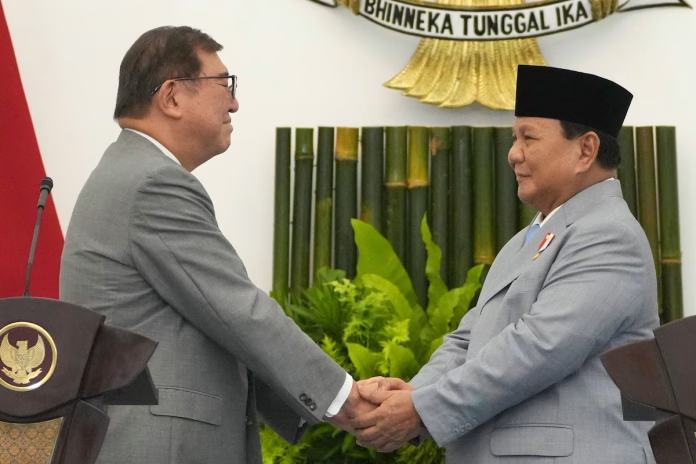Indonesia and Japan have agreed to boost cooperation in defence, energy, and food security. The agreement followed a meeting between President Prabowo Subianto and Prime Minister Shigeru Ishiba on 11 January. Japan aims to increase its influence in Southeast Asia through these initiatives.
Mr Ishiba became the first foreign leader to visit Indonesia in 2025. He met President Prabowo after completing a visit to Malaysia. During the meeting, Mr Ishiba expressed Japan’s interest in working with Indonesia on renewable energy and maritime security. He also emphasised technology transfer as a key area of focus.
President Prabowo asked Japan to support Indonesia’s priorities. These include a free school lunch programme and adding value to the country’s natural resources.
Japan’s active engagement in Southeast Asia is part of its strategy to counter China’s growing influence. Mr Ishiba plans to speak with President Ferdinand Marcos Jr of the Philippines and US President Joe Biden on 12 January, according to Mr Marcos’ office.
Japan recently provided Indonesia with a patrol vessel through a grant from the Japan International Cooperation Agency (JICA). Mr Ishiba mentioned this agreement, signed in December, as an example of Japan’s commitment to the region.
Regional influence
Japan and China both compete for influence in Southeast Asia, which is a market worth over US$3 trillion (£2.45 trillion). The region is home to about 700 million people. HSBC Holdings Plc reports that China remains the region’s largest trading partner, with US$911.7 billion (£744 billion) in trade in 2023. Japan ranks fourth.
Southeast Asian nations value China’s investments but remain wary of its assertive approach, particularly in the South China Sea. This waterway carries about 37 per cent of the world’s maritime crude oil, making it critical for global trade.
China claims much of the South China Sea based on a disputed 1940s map. Other nations and a United Nations tribunal have rejected these claims.
Indonesia has had disputes with Chinese vessels around the Natuna Islands. The Indonesian government asserts that this area is part of its exclusive economic zone, a claim China contests.
Balanced diplomacy
President Prabowo’s meeting with Japan highlights Indonesia’s neutral approach to the US-China rivalry. Indonesia follows an open foreign policy and avoids taking sides.
In April, Mr Prabowo visited President Xi Jinping of China, which was his first official state visit as president-elect. He then travelled to Japan, demonstrating Indonesia’s commitment to balanced international relations.
